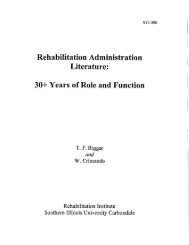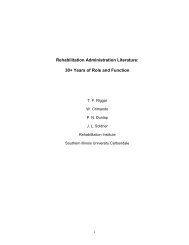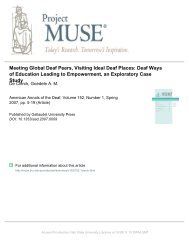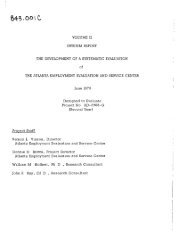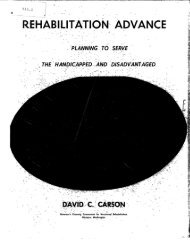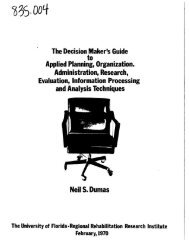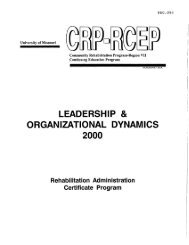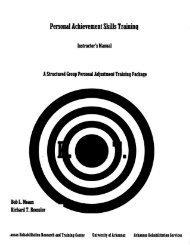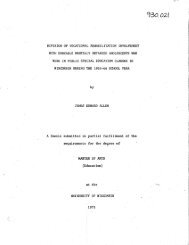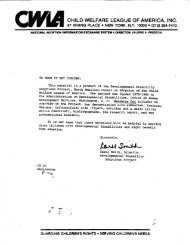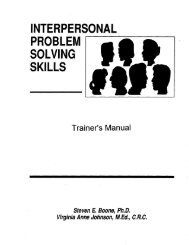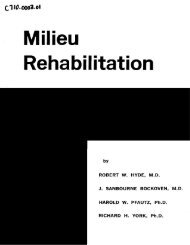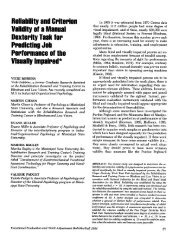Feature Issue on Faith Communities and Persons with ... - NCRTM
Feature Issue on Faith Communities and Persons with ... - NCRTM
Feature Issue on Faith Communities and Persons with ... - NCRTM
Create successful ePaper yourself
Turn your PDF publications into a flip-book with our unique Google optimized e-Paper software.
Overview<br />
7<br />
though elementary age students are supposedly<br />
more sophisticated, academic<br />
dem<strong>and</strong>s increase <strong>and</strong> social issues become<br />
more complex. In additi<strong>on</strong>, many<br />
teachers in religious school programs<br />
are not trained educators <strong>and</strong> most have<br />
had little to no experience instructing<br />
students <strong>with</strong> special learning needs.<br />
They often become frustrated <strong>and</strong> unwilling<br />
to devote extra effort to including<br />
these youngsters in class activities.<br />
Even <strong>with</strong> the best of intenti<strong>on</strong>s, any<br />
given learning envir<strong>on</strong>ment may be restrictive<br />
for an individual student unless<br />
a c<strong>on</strong>tinuum of opti<strong>on</strong>s is available.<br />
These opti<strong>on</strong>s include support for the<br />
regular teacher to help him or her buildin<br />
accommodati<strong>on</strong>s <strong>and</strong> modificati<strong>on</strong>s<br />
for the student <strong>with</strong> learning differences<br />
through c<strong>on</strong>sultati<strong>on</strong> <strong>with</strong> his/her secular<br />
school teacher; resource help<br />
through specific skill instructi<strong>on</strong> geared<br />
to individual needs; team-teaching by<br />
special educati<strong>on</strong> <strong>and</strong> regular classroom<br />
pers<strong>on</strong>nel; <strong>and</strong>, if necessary, specialized<br />
self-c<strong>on</strong>tained classes that provide intensive,<br />
highly individualized instructi<strong>on</strong><br />
<strong>with</strong> a low student-teacher ratio. Having<br />
a trained aide in the classroom to assist<br />
the youngster <strong>with</strong> disabilities as well as<br />
the teacher can make the difference between<br />
the ability to attend a c<strong>on</strong>gregati<strong>on</strong>al<br />
program <strong>and</strong> exclusi<strong>on</strong>.<br />
Besides c<strong>on</strong>gregati<strong>on</strong>al Sunday<br />
schools <strong>and</strong> religious schools, parochial<br />
day schools can also offer a range of supports<br />
for students <strong>with</strong> disabilities.<br />
Sadly, very few parochial schools currently<br />
accept students <strong>with</strong> developmental<br />
disabilities. Once again, exclusi<strong>on</strong> of<br />
children <strong>with</strong> disabilities has a spiritual<br />
impact <strong>on</strong> families. Although most of<br />
the teachers have had pedagogic training,<br />
parochial schools often are c<strong>on</strong>strained<br />
by budgetary limitati<strong>on</strong>s, additi<strong>on</strong>al<br />
expenses, <strong>and</strong> the intensity of the<br />
curriculum. However, a variety of development<br />
programs can be offered that<br />
enable educators to underst<strong>and</strong> the nature<br />
<strong>and</strong> needs of diverse learners. Exp<strong>and</strong>ing<br />
bey<strong>on</strong>d the c<strong>on</strong>cept of “special<br />
educati<strong>on</strong>” as involving <strong>on</strong>ly a small segment<br />
of the populati<strong>on</strong>, educators can<br />
broaden their underst<strong>and</strong>ing of the<br />
individual learning needs of all children.<br />
While it may appear to be a costly undertaking,<br />
the c<strong>on</strong>cept of inclusi<strong>on</strong> is in<br />
keeping <strong>with</strong> religious precepts.<br />
The religious/parochial school classroom<br />
is a living laboratory for implementing<br />
the religious values of dignity<br />
of the individual <strong>and</strong> acts of loving<br />
kindness. By creating a “caring community”<br />
<strong>with</strong>in the classroom, students get<br />
to actually practice reaching out to others<br />
<strong>and</strong> collaborating to make it possible<br />
for every<strong>on</strong>e to functi<strong>on</strong> effectively <strong>and</strong><br />
comfortably. Classmates can be helped<br />
to appreciate individual differences as a<br />
religious value <strong>and</strong> the youngsters <strong>with</strong><br />
disabilities benefit from interacting <strong>with</strong><br />
typical peers.<br />
In additi<strong>on</strong>, as children <strong>with</strong> developmental<br />
<strong>and</strong> other disabilities approach<br />
the times for celebrating the usual religious<br />
milest<strong>on</strong>es of young people, they<br />
can be involved in learning the rituals<br />
<strong>and</strong> prayers that will enable them to take<br />
their rightful places in their c<strong>on</strong>gregati<strong>on</strong>s.<br />
By starting early <strong>and</strong> breaking<br />
down the material into smaller comp<strong>on</strong>ents<br />
that can be rehearsed <strong>and</strong> mastered,<br />
they can participate in the worship<br />
services to the best of their<br />
abilities. Fortunately, it is rare these days<br />
to find a c<strong>on</strong>gregati<strong>on</strong> that will not allow<br />
them to celebrate becoming a Bar or Bat<br />
Mitzvah, or receive communi<strong>on</strong> or c<strong>on</strong>firmati<strong>on</strong>.<br />
Supports for Adults<br />
While many students experience inclusi<strong>on</strong><br />
in their regular school classrooms<br />
<strong>and</strong> in religious programs, <strong>on</strong>ce a child<br />
graduates he or she often becomes more<br />
isolated. Up<strong>on</strong> graduati<strong>on</strong>, school<br />
friends often go off to college or other<br />
lives. There is no adult social structure<br />
comparable to school in which every<strong>on</strong>e<br />
of the same age participates.<br />
<strong>Faith</strong> communities can play a major<br />
role in the valuing <strong>and</strong> inclusi<strong>on</strong> of<br />
adults <strong>with</strong> developmental disabilities in<br />
at least two significant ways. First, true<br />
inclusi<strong>on</strong> takes more than an individual<br />
simply attending weekly services, <strong>and</strong><br />
takes more than providing classes which<br />
separate people <strong>with</strong> disabilities from<br />
the rest of the church community. C<strong>on</strong>gregati<strong>on</strong>s<br />
can provide opportunities for<br />
full participati<strong>on</strong> through their regular<br />
adult committees or groups, such as<br />
men’s groups, women’s groups, choir,<br />
church decorating, ushers, etc. – in<br />
other words, opportunities for people to<br />
build deeper <strong>and</strong> more pers<strong>on</strong>al c<strong>on</strong>necti<strong>on</strong>s<br />
<strong>with</strong> <strong>on</strong>e another.<br />
Sec<strong>on</strong>dly, c<strong>on</strong>gregati<strong>on</strong> members can<br />
extend themselves in individual friendships,<br />
both <strong>with</strong>in the church <strong>and</strong> the<br />
wider community. Social ministry programs<br />
can identify more isolated c<strong>on</strong>gregati<strong>on</strong><br />
members <strong>and</strong> provide fellowship<br />
<strong>and</strong> friendship. Structured programs<br />
like Robert Wood Johns<strong>on</strong>’s <strong>Faith</strong> in<br />
Acti<strong>on</strong> initiatives have provided many<br />
opportunities for true friendship, which<br />
others can emulate even <strong>with</strong>out a structured<br />
program. Sometimes adults <strong>with</strong><br />
disabilities who live <strong>with</strong> their parents<br />
remain somewhat isolated <strong>with</strong>in the<br />
family structure. Other c<strong>on</strong>gregati<strong>on</strong><br />
members can reach out to support expansi<strong>on</strong><br />
of the social networks of these<br />
individuals.<br />
C<strong>on</strong>clusi<strong>on</strong><br />
C<strong>on</strong>gregati<strong>on</strong>s play a key role in promoting<br />
inclusive communities. Supporting<br />
inclusi<strong>on</strong> through faith communities reinforces<br />
wholeness <strong>on</strong> the individual<br />
<strong>and</strong> societal levels. An individual’s<br />
wholeness depends <strong>on</strong> addressing all<br />
their needs, including spiritual needs. A<br />
community’s wholeness depends <strong>on</strong> the<br />
valuing, participating, <strong>and</strong> bel<strong>on</strong>ging of<br />
all its members.<br />
Angela Novak Amado is Research Associate<br />
<strong>with</strong> the Research <strong>and</strong> Training Center <strong>on</strong><br />
Community Living, Institute <strong>on</strong> Community<br />
Integrati<strong>on</strong>, University of Minnesota,<br />
Minneapolis. She may be reached at 651/<br />
698-5565 or by e-mail at amado003@<br />
umn.edu. Sara Rubinow Sim<strong>on</strong> is retired<br />
Director of the Special Needs Department,<br />
Board of Jewish Educati<strong>on</strong> of Greater<br />
Washingt<strong>on</strong>, Rockville, Maryl<strong>and</strong>. She may<br />
be reached at 301/255-1958 or at srsim<strong>on</strong><br />
@erols.com.<br />
Published <strong>on</strong> the Web site of the Institute <strong>on</strong> Community Integrati<strong>on</strong> (http://ici.umn.edu/products/impact/143/).



